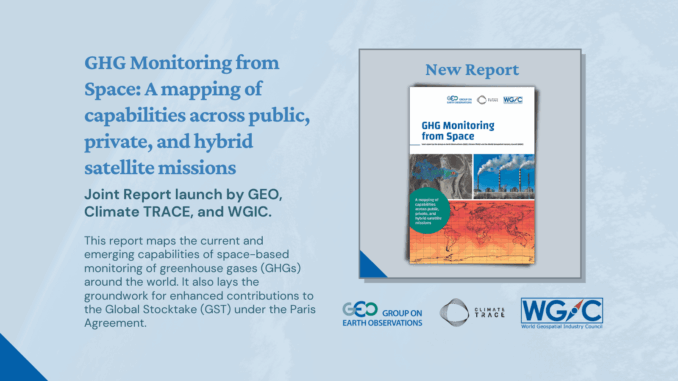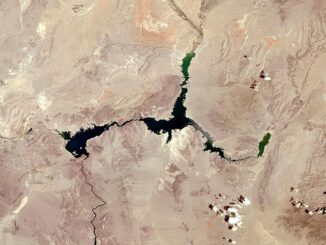
This report maps the current and emerging capabilities of space-based monitoring of greenhouse gases (GHGs) worldwide. It also lays the groundwork for enhanced contributions to the Global Stocktake (GST) under the Paris Agreement.
Amersfoort, The Netherlands, November 3, 2021 – A joint report titled “GHG Monitoring from Space: A mapping of capabilities across public, private and hybrid satellite missions” from the Group on Earth Observations (GEO), Climate TRACE, and the World Geospatial Industry Council (WGIC) was released at the UNFCCC Earth Information Day, held on November 3, 2021, at Glasgow, Scotland during COP26.
WGIC’s role was to coordinate information, on behalf of the private sector, and bring together information and insights on the private and hybrid GHG satellite missions.
Key policy messages emerging from the report are:
- Satellite observations reduce uncertainty in GHG emission monitoring by providing data across a range of spatial, temporal, and spectral resolutions or scales;
- Government space agencies have the capability to collect national and global baseline data for all relevant GHGs in a sustained manner with measurement availability ranging into the 2040s;
- Private sector companies are speedily entering the market and bringing additional point-source emissions monitoring capabilities for specific GHGs;
- Hybrid models are increasingly emerging and leveraging respective strengths;
- Collaboration, innovation, and financing are key levers for GHG monitoring from space;
- Open data, open science and open knowledge are essential to driving on-the-ground solutions; and
- New opportunities are arising for analyzing secondary remote sensing measurements with frontier IT technologies which call for transparency and capacity development.
WGIC aims to strengthen its collaborations on Climate action
Currently, WGIC focuses on climate change and its impact on the thematic areas of disaster resilience, energy transition, and resilient infrastructure. For this, WGIC works in close collaboration with various global organizations.
On the launch of this report, Barbara Ryan, Executive Director, WGIC, said, “WGIC, as the leading organization representing the global commercial Earth observation and geospatial sector, is committed to collaborating with the climate community, and the United Nations Framework Convention on Climate Change (UNFCCC), in particular, to achieve its objectives by more fully utilizing geospatial data and insights. I would like to particularly thank WGIC Members – GHGSat and Planet for participating in this inaugural effort being launched at COP26.”
To access the report, please visit this link – GHG Monitoring from Space report.
For more information and collaborations, please contact us.
For media enquiries, please write to [email protected].




Be the first to comment